QuestionHi, I"m starting my first aquarium & heard some nasty stories about Amonia & what follows. What can I do to prevent them from becoming a problem?I"m just buying some goodies to put in my first tank! :) Thanks!
AnswerDear Alan, i'm sorry for responding to you so late. This is because our website has been under some re-doing and many pages have difficult times loading and many errors also.
~Don't let those horrible stories discourage you! ;-)
My first question is-are you aware and know decently enough about the cycling process? And how bacterial colonies develop? If not I'll explain-
When aquariums are first started up, they are basically considered "sterile" which means they are devoid of all the microscopic critters that makes keeping aquariums healthy--possible. Special bacteria that slowly develop in your take time to colonize all the available surfaces in your aquarium. These bacteria (also known as Nitrosomas and Nitrobacter) consume ammonia which is the by-product of fish waste and convert this dangerous substance into a less toxic but still harmful compound called, "Nitrite" Now nitrite is still quite harmful to all aquatic life. Fortunately as time progresses and the aquarium gets established, more bacteria convert the nitrite into nitrate which is the least toxic of them all and is the end of the bacterial cycle.
*Establishing a good beneficial bacteria colony takes a very long time. Anywhere from 4-6 weeks, give or take. It all depends on your situation. There is a fine line in adding fish to your new aquarium without subjecting them to dangerous compounds in the water. But never fear, it can be done safely.
*What first needs to be done is insuring you have all your equipment running smoothly- filter, heater (if neccessary) lights and possibly airstone. I have found that allowing an aquarium to sit fishless for a week does wonders for their health. You may not have the same result but overall I feel it's good to allow an aquarium to sit for several days at least. -Now you have the choice between fish cycling and fishless cycling. Fishless cycling means using an ammonia source from an non-living thing such as a pinch of flakes, an chunk of frozen salad shrimp, or pure ammonia. I prefer the flakes or shrimp method. If you would like more info on fishless cycling, just let me know.
Fishless cycling means to not subject a fish to possible high ammonia levels and it is considered more humane.
But fish cycling can be done with very minimal stress to the fish. here are the steps as followed for a sucessful cycling-
*After your aquarium has been running and all equipment is running smoothly for at least a few days, add 2 ONLY two small hardy fish. Look for Black skirt tetras as these guys are the best I know of around for cycling. PLEASE do not add anymore fish after you get your two tetras. Patience.
-Acclimate your Black skirt tetras by floating their bag with the aquarium light off for 20 minutes, then open the bag and add half a cupful of aquarium water to the bag, retie it and let is sit for 5 minutes then add another half-cupful. This is the best method for avoiding shocking the tetras by only acclimating them to the temperature and not the chemistry of your water. Unless you are certain your tank and bag chemistry if the same this is the best method.
-After the bag's water is almost about to be too full, you can consider it safe to gently net out your tetras and free them in your aquarium. Dump the bag water. tip: using the slow acclimation is easier if--after floating the bag in the aquarium for 20 minutes, sitting the whole bag in a clean 1gal pitcher to make it easier and to support the bag.
~
Now your into the business of cycling. Your two tetras may or may not eat the first day of their arrival. But feel free to try just a tiny minute bit of flakes after they have gotten accostumed to your aquarium. If your tetras don't eat, please net out the uneaten food right away.
-By the next day, test your aquarium water for ammonia and nitrites. If any of these are above safe bounds, do an immediate 30-50% water change to avoid any stress on the fish. ~Always make the replacement water equal in temperature to that of your aquarium water and always dechlorinate it with a water conditioner~ *Remember feed extremely lightly, once a day.
-Continue to test your ammonia, nitrite and nitrate levels every day for the next several weeks. *First you may see your ammonia levels rise and then fall, and then nitrite will rise and fall and finally nitrate will begin to appear. Remember this takes time and will depend on your situation. All aquariums are different.
-When you notice your ammonia levels dropping considerably and nitrite doing the same you are close to completion.
-patience
- Continue to make those vital water changes when ammonia or nitrite may be above safe levels.
-Feed very lighty--please don't add ANY more fish
-When your ammonia and nitrite have dropped to zero and nitrate is on the rise your aquarium has cycled! *And you can now consider it safe to add some of the fish you had in mind. It's good during cycling with only a few fish to research compatible species ahead of time and know all about their needs and temperments for happier aquarium residence. Research ahead of time before buying any fish or aquatic critter is the first step of responsible fish care.
Just remember, you can get through cycling just fine as long as you test your water every day and do those vital water changes. Please do not add any more fish than your cyclers until the aquarium is completely established.
~Remember to test after each new arrival to insure you don't get an ammonia or nitrite spike. If so, you'll need to do a water change and pull out your patience again as your beneficial bacteria colonies adjust to the new bioload.
I really hope this helps! Best wishes to you and your new aquarium. Warning: this is an addictive hobby and there are no rehabs for "MTS" patients (Multiple tank symdrome) ;-)Only Joking. Seriously, I do hope you enjoy this hobby and best of luck with cycling your new aquarium!
Happy fishkeeping!
Karen~

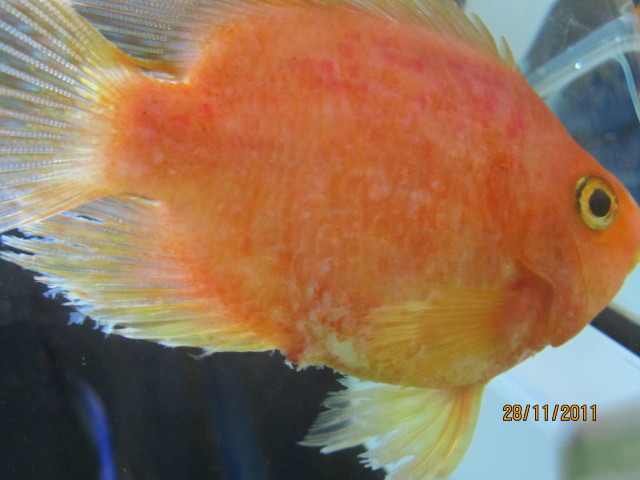 parrot fish disease
Question
parrot fish
i find out today the skin o
parrot fish disease
Question
parrot fish
i find out today the skin o
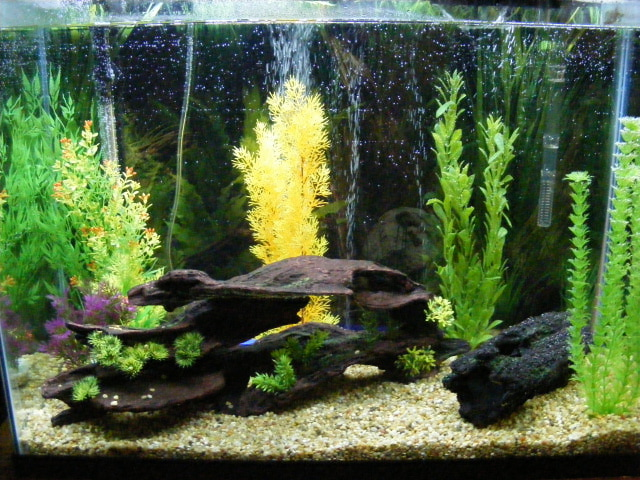 bubbles
Question
bubbles bubbles 2
Hello Richard,
bubbles
Question
bubbles bubbles 2
Hello Richard,
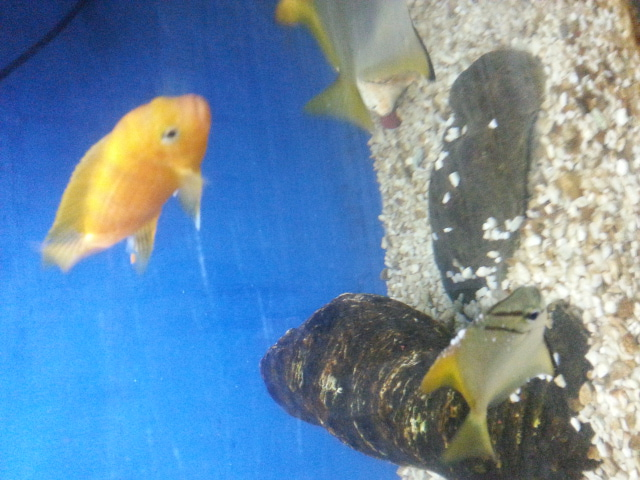 2 questions fr u!
Question
mono angel with some w
1)Recently I dis
2 questions fr u!
Question
mono angel with some w
1)Recently I dis
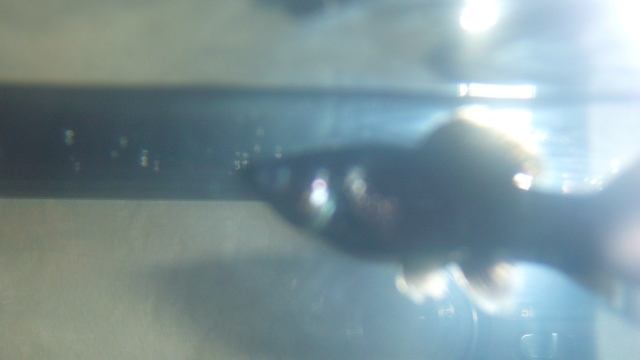 sick mollie
Question
sick mollie
I have a black mollie that is moth
sick mollie
Question
sick mollie
I have a black mollie that is moth
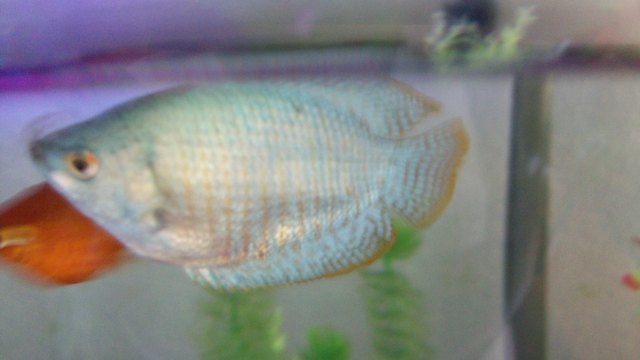 Putting a Female Dwarf Gourami with my 2 Male Dwarf Gouramis
QuestionGouramis
QUESTION: Hello! Have a few Gou
Putting a Female Dwarf Gourami with my 2 Male Dwarf Gouramis
QuestionGouramis
QUESTION: Hello! Have a few Gou